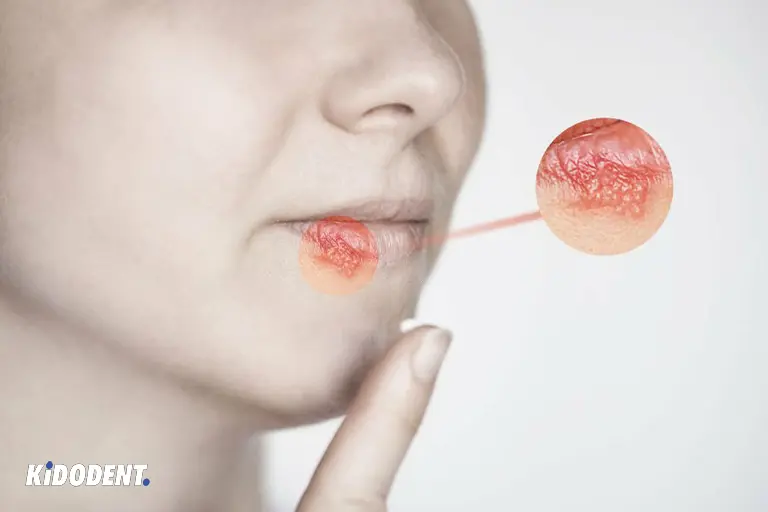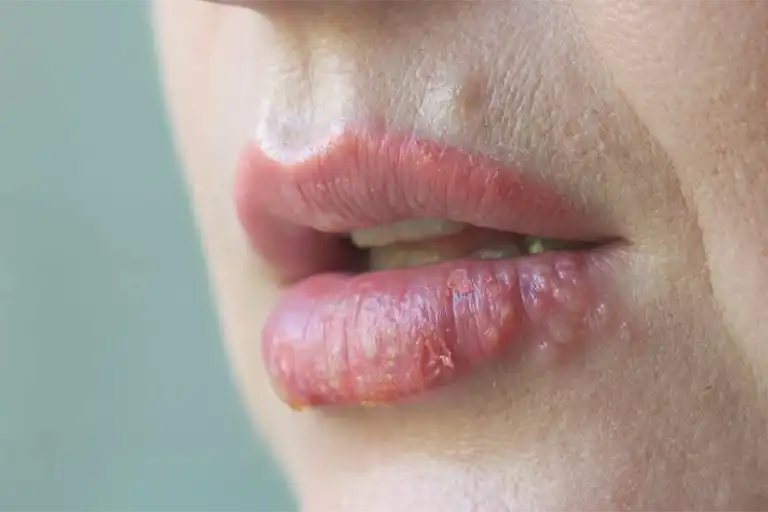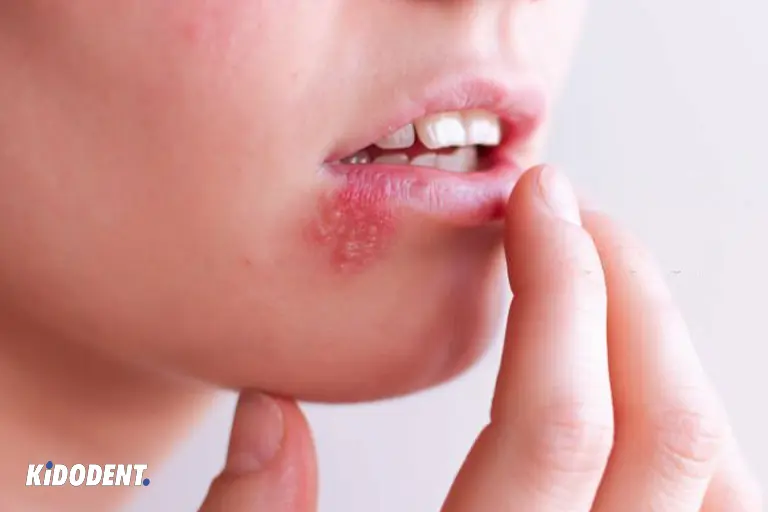You may have seen cold sores that pop up on or around the lips from time to time, but these blister-like sores appear not only around the mouth and lips but inside the mouth, too, like on the tongue and roof of the mouth. They are called oral herpes because it is caused by a common virus called herpes simplex virus.
In this article, we will go over the common questions about oral herpes on the tongue like: What causes herpes on the tongue? What are the symptoms of oral herpes and what it looks like? And what are the treatments and preventions for this viral mouth infection?
What is oral herpes (cold sores)?
Oral herpes, also called cold sores or fever blisters, is a painful chronic lesion caused by herpes simplex virus. There are two types of herpes virus: the herpes simplex virus type 1(HSV-1), which is associated with oral herpes, and the herpes simplex virus type 2 (HSV-2), which causes genital herpes. But both of them can affect the mouth and genitals. Once affected by the virus, it remains in the body and stays dormant until reactivated. Some people may show no symptoms, but others will have painful sores. You may also have periodic outbreaks, which the sores appear again.
Is oral herpes common?
The herpes simplex virus (HSV), or simply herpes, is a quite common infection. Oral herpes is contagious and is transmitted by oral contact through saliva or by skin-to-skin contact with the people who have the virus. Therefore, it is easily contracted from one person to another such as when kissing or using shared utensils as well as by using towels and other personal care objects that belong to the infected person. And it can be spread with oral sex.
Even when not visible as a sore, the virus can be transmitted.
According to an estimate by World Health Organization in 2016, 67% of the population, or 3.7 billion people under the age of 50, live with the herpes infection.

What causes oral herpes on the tongue?
Oral herpes is caused by herpes simplex virus, mainly by type 1 (HSV-1). Both types of herpes, HSV-1 or HSV-2, can spread to the face and genitals once infected with the virus.
Since the HSV virus is highly contagious, it is prevalent and affects the majority of people with at least one form of herpes types. Like HSV-1, which is acquired mostly during childhood. With age, the risks of the virus activity increase, and certain body conditions, such as stress, hormonal changes (e.g., puberty, menstruation), and UV sun exposure can trigger the sores to appear.
Although most people with oral herpes infection are asymptomatic and show no symptoms, the infection is lifelong and appears frequently over the years. It varies from mild to severe when erupts.
Oral herpes is transmitted when you come into the infected person closely such as when:
- Kissing
- Having oral intimacy
- Using razors, towels and other personal care items
- Eating or drinking from shared utensils
- Using creams and other cosmetics of the infected person
Where does oral herpes infection occur?
Usually, blisters form around or on the lips (labial herpes) and areas surrounding your mouth and can spread to the nose, chin, and cheeks. But oral herpes can occur inside the mouth, on your tongue and roof of the mouth. Sometimes you can expect herpes infection to appear on the hand and other areas on your skin.
With the other variation, genital herpes, sores affect the sexual organs.
Generally, oral herpes can appear:
- On or around the lips
- Tongue
- Roof of the mouth
- Gums
- Throat
- Chin and on the cheeks
What does oral herpes infection look like?
Herpes comes as fluid-filled blisters that are usually formed in a tiny group of bubbly patches or one single sore. Cold sores have a red base. When the blister ruptures after a day or two, it leaves a red ulcer and forms a scab with dry, yellowish crust on top. The blisters are painful and it takes 2-3 weeks to heal from the cold sores without scarring the area.
The infection does not result in blisters immediately and you may have certain symptoms similar to those in the flu. You may have symptoms such as:
- Fever
- Headache
- Swollen lymph nodes
- Pain in the gums
- Fatigue and muscle pains
Depending on the individual, the severity of the herpes infection varies.
What are the different stages of oral herpes infection?
Herpes simplex virus goes through three stages once infection occurs. Whether it is oral herpes (cold sores) or other variations, the virus passes through primary infection, latency stage, and recurrence.
- Primary infection:
-
The first stage of infection involves exposure to the virus from skin or mucous membrane and reproduction. If you are asymptomatic, no sores and symptoms may be detected. Otherwise, headache, fever, muscle pain, gum pain, and swollen lymph nodes are common symptoms you will experience. The blisters appear on the infected area and you will experience:
- Feeling itchy and burning on the site. Before coming of the sore, burning and itchy feelings cause discomfort on the infected site, which show that the sore is about to erupt around the lips or inside the mouth on your tongue.
- Eruption of the blisters. The small, fluid-filled blisters that occupy the infected area appear and form a patch with a red base and sometimes it can be a group of sores.
- Bursting of the blisters. The sores start to crust over and ooze with a yellowish liquid. It then forms shallow, crusted, and dry spots on the skin or inside the mouth.
- Latency:
-
The virus reproduces and becomes inactive until it is triggered. Meanwhile, it inhibits the mass nerve tissues in the spine, which is called dorsal root ganglion.
- Recurrence:
-
The infection can appear again usually on the same site, causing sores that last 2 to 3 weeks before it heals. You will most likely experience milder herpes infection than your first exposure to the virus.
Risk factors & complications of oral herpes infection
Oral herpes, or as is it termed cold sores, go away on their own without treatments. But if your immune system is weakened and you have certain conditions, then you should see a doctor or dentist like in case of:
- Immunocompromised individuals in which herpes sores may take longer to go, such as people who are undergoing chemotherapy or people with conditions such as HIV/AIDS.
- People with Eczema (atopic dermatitis), which is a skin condition, can experience medical emergency with cold sores and require immediate care.
- Eye infection in which the virus can potentially cause infections in the eye. The virus can spread to the eye with repeated occurrences, which increases the chance that you may have touched your eyes with the same hand or object infected with the sores.
- Severe symptoms or high frequency of the infection which require doctor management and medical tests. Your doctor will explain the reason for repeated occurrence of the infection or may diagnose an underlying condition.
How to prevent oral herpes?
As herpes virus is contagious and transmission is easy, you need to pay more attention on ways that it can spread. Infections such as oral herpes can be aesthetically problematic when occur around the mouth (which normally they do) and cause discomfort especially when they arise in the mouth and on your tongue.
If you are infected with the virus, it is reasonable to take precautions and avoid spreading it to other people. And if you don’t have the infection, you need to be careful on physical contact with people who have the sores on their body. Try to prevent herpes virus – both HSV-1 and HSV-2– from entering your body with the following ways:
- Avoid kissing and skin-to-skin contact while sores are present.
-
The saliva of the infected person bears the infection and kissing should be avoided. Also, once herpes sores come into contact with the skin, they infect other people easily. Avoid direct contact when blisters are present. Because of highly contagious liquid that leaks from the sores, you should be aware not to touch other parts of your body to prevent more progression to other areas.
- Always wash your hands.
-
During the time of your cold sores, try to keep your hands clean regularly.
- Avoid sharing utensils and other personal items.
-
Sharing items like towels, shavers, utensils, lip balms, and cosmetic objects can easily transmit the virus. Therefore, you should let others know about this and keep your personal objects away from other people or your family members.
- Lower the recurrence chances.
-
The herpes simplex virus resides in the body and it may show up again. You should therefore try as much to prevent further recurrences. As a preventive way besides hygiene measurements that you follow daily, reduce your emotional stress and avoid other possible triggers like intense sunlight exposure. You can also use sunblock on your lips which is the most common spot for reappearance of the cold sores.

How is oral herpes treated?
Although there is no cure for herpes infection yet, treatments by doctors and home remedies can help you relieve the discomfort and speed up the healing.
Common treatments include:
Antiviral medications. Your doctor can prescribe antiviral medications to take orally as in pills. Antivirals are the best treatments for oral herpes. Some of these medications come as creams with prescription only to apply on your skin for several times. Antivirals help you to have less severe symptoms and fight the virus during the breakout. They are effective in case several outbreaks occur. The most common antiviral medications for treating herpes infection are:
- Acyclovir
- Famciclovir
- Valacyclovir
- Penciclovir (Denavir) cream
Over-the-counter medications. You can buy creams, ointments or medicines from either online or your local drugstore for home applications. Creams and ointments are mostly for topical use and should not be used inside the mouth. You should consult your doctor on in-mouth applications of creams because of possible toxic materials. Instead, you can use oral medicines for your oral herpes on the tongue. Major OTC creams and medicines include:
- Zin oxide cream: You can use zinc oxide cream to protect the lips or other parts of body against the sun exposure. Zinc oxide cream contributes to better and faster healing process and prevent the virus from getting on to the other parts of the skin.
- Abreva docosanol cream: Abreva is another cold sore cream to apply on your infected skin for shorter healing time. It helps you get over the herpes infection quickly and prevents more progression of the virus on your skin.
- Lysine (also for oral intake): Lysine is an essential amino acid also found naturally in foods. It is available as oral supplements and ointment. Apply Lysine cream daily on the infected skin according to the recommended period of time for cold sores treatment. Also, consult with your doctor on usage and daily dosage of Lysine pill.
Antibacterial mouthwashes. As good home remedies, natural mouthwashes and those with antibacterial/anti-inflammatory properties help to get rid of bacterial activity and soothe the pain of oral herpes. Mouthwashes containing alcohol can be effective in making the inside the mouth drier because of dry nature of alcohol and therefore heal the sores more quickly.
Conclusion
Oral herpes is a common viral infection that may target anybody at some point. Fortunately, it is treatable and antiviral medications work well against the disease. There are plenty of other choices ranging from over-the-counter topical ointments and creams to mouthwashes for a speedy recovery and less discomfort.
Oral herpes can cause aesthetic troubles when on face but resolve on their own and you don’t need to worry about it.
See a doctor or the dentist if you have immune system problems to better get the oral herpes under control.
If you do practice good oral hygiene and take good care of your health, whether during the outbreak or at other times, oral herpes cannot be a problem.
